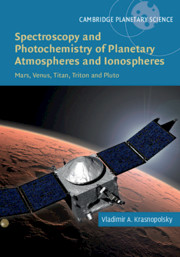Refine listing
Actions for selected content:
17002 results
14 - Triton
-
- Book:
- Spectroscopy and Photochemistry of Planetary Atmospheres and Ionospheres
- Published online:
- 09 February 2019
- Print publication:
- 14 February 2019, pp 443-466
-
- Chapter
- Export citation
11 - Mars
-
- Book:
- Spectroscopy and Photochemistry of Planetary Atmospheres and Ionospheres
- Published online:
- 09 February 2019
- Print publication:
- 14 February 2019, pp 155-237
-
- Chapter
- Export citation
Copyright page
-
- Book:
- Spectroscopy and Photochemistry of Planetary Atmospheres and Ionospheres
- Published online:
- 09 February 2019
- Print publication:
- 14 February 2019, pp vi-vi
-
- Chapter
- Export citation
8 - Solar Radiation, Its Absorption in the Atmospheres, and Airglow
-
- Book:
- Spectroscopy and Photochemistry of Planetary Atmospheres and Ionospheres
- Published online:
- 09 February 2019
- Print publication:
- 14 February 2019, pp 103-119
-
- Chapter
- Export citation
3 - Spectroscopy
-
- Book:
- Spectroscopy and Photochemistry of Planetary Atmospheres and Ionospheres
- Published online:
- 09 February 2019
- Print publication:
- 14 February 2019, pp 30-51
-
- Chapter
- Export citation
References
-
- Book:
- Spectroscopy and Photochemistry of Planetary Atmospheres and Ionospheres
- Published online:
- 09 February 2019
- Print publication:
- 14 February 2019, pp 497-535
-
- Chapter
- Export citation
Preface
-
- Book:
- Spectroscopy and Photochemistry of Planetary Atmospheres and Ionospheres
- Published online:
- 09 February 2019
- Print publication:
- 14 February 2019, pp xiii-xvi
-
- Chapter
- Export citation
12 - Venus
-
- Book:
- Spectroscopy and Photochemistry of Planetary Atmospheres and Ionospheres
- Published online:
- 09 February 2019
- Print publication:
- 14 February 2019, pp 238-366
-
- Chapter
- Export citation
Index
-
- Book:
- Spectroscopy and Photochemistry of Planetary Atmospheres and Ionospheres
- Published online:
- 09 February 2019
- Print publication:
- 14 February 2019, pp 536-542
-
- Chapter
- Export citation
4 - Aerosol Extinction and Scattering
-
- Book:
- Spectroscopy and Photochemistry of Planetary Atmospheres and Ionospheres
- Published online:
- 09 February 2019
- Print publication:
- 14 February 2019, pp 52-64
-
- Chapter
- Export citation
9 - Chemical Kinetics
-
- Book:
- Spectroscopy and Photochemistry of Planetary Atmospheres and Ionospheres
- Published online:
- 09 February 2019
- Print publication:
- 14 February 2019, pp 120-139
-
- Chapter
- Export citation
Plate Section (PDF Only)
-
- Book:
- Spectroscopy and Photochemistry of Planetary Atmospheres and Ionospheres
- Published online:
- 09 February 2019
- Print publication:
- 14 February 2019, pp 536-542
-
- Chapter
- Export citation
10 - Photochemical Modeling
-
- Book:
- Spectroscopy and Photochemistry of Planetary Atmospheres and Ionospheres
- Published online:
- 09 February 2019
- Print publication:
- 14 February 2019, pp 140-154
-
- Chapter
- Export citation
5 - Quantitative Spectroscopy
-
- Book:
- Spectroscopy and Photochemistry of Planetary Atmospheres and Ionospheres
- Published online:
- 09 February 2019
- Print publication:
- 14 February 2019, pp 65-77
-
- Chapter
- Export citation

Spectroscopy and Photochemistry of Planetary Atmospheres and Ionospheres
- Mars, Venus, Titan, Triton and Pluto
-
- Published online:
- 09 February 2019
- Print publication:
- 14 February 2019
7 - Energy Transport in Stars
- from Part I - Stellar Structure
-
- Book:
- Stars and Stellar Processes
- Published online:
- 21 March 2019
- Print publication:
- 07 February 2019, pp 153-187
-
- Chapter
- Export citation
Preface
-
- Book:
- Stars and Stellar Processes
- Published online:
- 21 March 2019
- Print publication:
- 07 February 2019, pp xxiii-xxvi
-
- Chapter
- Export citation
Appendix B - Natural Units
-
- Book:
- Stars and Stellar Processes
- Published online:
- 21 March 2019
- Print publication:
- 07 February 2019, pp 502-504
-
- Chapter
- Export citation
11 - Neutrino Flavor Oscillations
- from Part II - Stellar Evolution
-
- Book:
- Stars and Stellar Processes
- Published online:
- 21 March 2019
- Print publication:
- 07 February 2019, pp 253-270
-
- Chapter
- Export citation
19 - Nova Explosions and X-Ray Bursts
- from Part III - Accretion, Mergers, and Explosions
-
- Book:
- Stars and Stellar Processes
- Published online:
- 21 March 2019
- Print publication:
- 07 February 2019, pp 421-428
-
- Chapter
- Export citation
